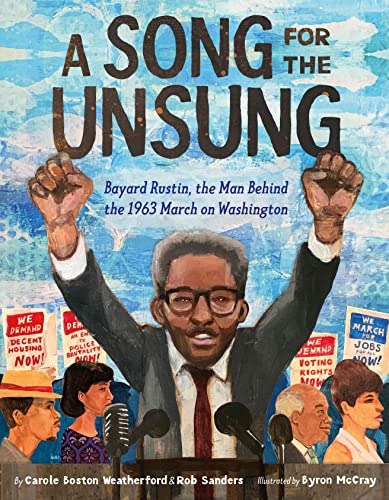The Radical Agenda may utilize affiliate links for recommended books and resources. This means we may earn a small commission from clicks or purchases through those links at no cost to you. We only recommend products and services we believe in. All opinions shared are entirely our own. Thank you for supporting The Radical Agenda!
This Black Gay Man Organized the 1963 March on Washington
I accidentally borrowed several library books that all tell different parts of the story of the March on Washington, and it was one of the best accidents ever. This one, A Song for the Unsung: Bayard Rustin, the Man Behind the 1963 March on Washington by Carole Boston Weatherford and Rob Sanders was the first book we read of the group and was just so fun.
Bayard Rustin was raised by non-violent activists and became one himself, even influencing Dr Martin Luther King, Jr.’s nonviolent approach to social protest.
Later in the book, the authors mention that Bayard Rustin was a gay man, an important intersectional aspect of his activism. It meant that many leaders doubted his ability to do his job well. However, when it was time to organize the March on Washington, one of the leaders knew he was the right one for the job. The book says Rustin’s goal was to get 100,000 people to participate in the March, the final count ended up being closer to 250,000! Bayard Rustin’s dedication and determination is a testament to the difference one man can make in a movement.
If you’ve been reading The Radical Agenda for awhile, you might recognize Rob Sanders as the author behind other LGBTQ+ books for kids like Pride: The Story of Harvey Milk and Stonewall: A Building, An Uprising, a Revolution. This book is definitely another winner among them. Carole Boston Weatherford also has a book reviewed here, Unspeakable: The Tulsa Race Massacre. Basically, the two of them are fantastic authors for introducing young children to big topics and I will likely review all of the books they write about people and events in American history.

Themes
Intersectionality
Learning about intersectionality (how one aspect of our lives interacts with another facet of our lives, like one of those graphs on a board game for Battleship) has been briefly introduced in other books we have read together, but not quite like this one. A Song for the Unsung was a simple and masterful way to introduce the idea of how a Black man was treated in the 1960s, and how being gay also influenced the way he was treated, his career opportunities, and more.
Conversations
When I tell you that as soon as I realized this August (2023) is the 60th anniversary of the March on Washington I started to look into the cost of plane tickets for a quick weekend field trip, I mean it took me about 5 minutes after the boys fell asleep to start looking it up.
Unfortunately, the timing doesn’t work for us to get to Washington DC in August, but hopefully soon!
The boys and I talked about how being Black in 1963 meant you were treated differently, and being gay meant you were treated differently. And being both, well, that would have been really hard. Both boys agreed that Bayard Rustin was brave to be who he was in the face of so much discrimination.
My goal with my boys has always been to be a safe place for them to explore their passions and express themselves however they feel the most authentic. My hope is that by modeling that love and acceptance and safety, they will be able to notice others, like Bayard Rustin, and offer that same safety to them.
Age Level
My eight-year-old loved this book and was shocked when we got to the part that mentioned he beat his goal by having over double the amount of people attend the March on Washington. My five-year-old liked when we talked about going to Washington DC to walk where the marchers walked and visit the museums.


0 Comments
Trackbacks/Pingbacks